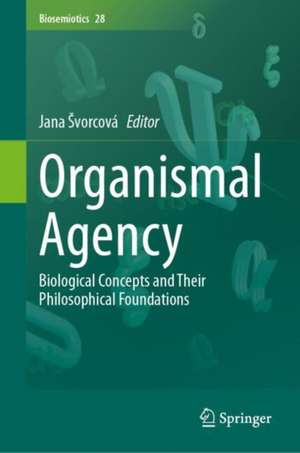Organismal Agency: Biological Concepts and Their Philosophical Foundations: Biosemiotics, cartea 28
Editat de Jana Švorcováen Limba Engleză Hardback – 10 mai 2024
Din seria Biosemiotics
- 18%
 Preț: 948.92 lei
Preț: 948.92 lei - 15%
 Preț: 640.55 lei
Preț: 640.55 lei - 18%
 Preț: 783.20 lei
Preț: 783.20 lei - 15%
 Preț: 644.30 lei
Preț: 644.30 lei - 15%
 Preț: 583.61 lei
Preț: 583.61 lei - 18%
 Preț: 1559.94 lei
Preț: 1559.94 lei - 15%
 Preț: 647.08 lei
Preț: 647.08 lei - 24%
 Preț: 784.02 lei
Preț: 784.02 lei - 24%
 Preț: 777.07 lei
Preț: 777.07 lei - 18%
 Preț: 1660.18 lei
Preț: 1660.18 lei - 18%
 Preț: 1103.93 lei
Preț: 1103.93 lei - 15%
 Preț: 653.98 lei
Preț: 653.98 lei - 18%
 Preț: 722.43 lei
Preț: 722.43 lei - 18%
 Preț: 1004.48 lei
Preț: 1004.48 lei - 18%
 Preț: 780.82 lei
Preț: 780.82 lei - 24%
 Preț: 643.53 lei
Preț: 643.53 lei - 18%
 Preț: 734.90 lei
Preț: 734.90 lei - 18%
 Preț: 794.07 lei
Preț: 794.07 lei - 15%
 Preț: 638.39 lei
Preț: 638.39 lei - 18%
 Preț: 1845.44 lei
Preț: 1845.44 lei - 18%
 Preț: 941.38 lei
Preț: 941.38 lei - 18%
 Preț: 947.85 lei
Preț: 947.85 lei - 18%
 Preț: 1217.27 lei
Preț: 1217.27 lei - 18%
 Preț: 1661.13 lei
Preț: 1661.13 lei - 18%
 Preț: 1217.86 lei
Preț: 1217.86 lei - 18%
 Preț: 894.46 lei
Preț: 894.46 lei
Preț: 733.15 lei
Preț vechi: 894.09 lei
-18% Nou
Puncte Express: 1100
Preț estimativ în valută:
140.28€ • 146.100$ • 115.97£
140.28€ • 146.100$ • 115.97£
Carte tipărită la comandă
Livrare economică 12-26 aprilie
Preluare comenzi: 021 569.72.76
Specificații
ISBN-13: 9783031536250
ISBN-10: 3031536258
Ilustrații: IX, 291 p. 11 illus., 2 illus. in color.
Dimensiuni: 155 x 235 mm
Greutate: 0.6 kg
Ediția:2024
Editura: Springer International Publishing
Colecția Springer
Seria Biosemiotics
Locul publicării:Cham, Switzerland
ISBN-10: 3031536258
Ilustrații: IX, 291 p. 11 illus., 2 illus. in color.
Dimensiuni: 155 x 235 mm
Greutate: 0.6 kg
Ediția:2024
Editura: Springer International Publishing
Colecția Springer
Seria Biosemiotics
Locul publicării:Cham, Switzerland
Cuprins
Chapter 1. Knowing what an organism is.- Chapter 2. Aristotle: Life as Self-Creation.- Chapter 3. Aristotle and Functional Bauplans.- Chapter 4. Immanuel Kant: Mechanism, Teleology, Organism, and the Powers of Our Mind.- Chapter 5. Schelling’s Philosophy of Nature.- Chapter 6. Organismic Teleology and Agency beyond Systems Theories: A Process-Metaphysical Perspective.- Chapter 7. The becoming of identity: A process-ontological view on the relational co-existence of biological beings.- Chapter 8. (Bio)semiosis as life-specific form of agency.- Chapter 9. Plastic ontogenesis: Memory, closure, and habitual teleology in development.- Chapter 10. Ontogenesis, Organisation, and Organismal Agency.- Chapter 11. Biological modularity and the origins of agency.- Chapter 12. Agential patterns in development and evolution: Towards an anti-entropic approach to the divergence of altricial and precocial mammals.- Chapter 13. Organisms as agents in zoosemiotic perspective: The case of Umwelt reversion.- Chapter 14. Agency and Appearance: Reading the Face of Life.
Notă biografică
Jana Švorcová, Ph.D., is an assistant professor at the Department of Philosophy and History of Sciences of the Faculty of Science, Charles University, Prague. She teaches theoretical and evolutionary biology. Her research focuses on non-mechanistic approaches to the living within the philosophy of biology, nongenetic evolutionary variation and inheritance, as well as organismal agency.
Textul de pe ultima copertă
This book explores the notion of organismal agency from the perspective of both philosophy and biology. The two sections of the book delve into parallel themes, including distinctions between organic and inorganic nature, self-organization, autonomy, self-presentation, memory, umwelt, and environmental influence. The philosophical part focuses on the influential thinkers who shaped our perception of living entities beyond mere mechanisms. It scrutinizes the concepts of organism and nature in the works of Aristotle, Kant, Schelling, and various processualists. Each chapter explores facets of their ideas that directly or indirectly foreshadowed or contributed to the formulation of the concept of agency. The biological part of the book investigates various concepts associated with agency such as experience, meaning attribution, and phenotypic plasticity, as well as reproduction, organisational constraints, modularity, development of integrated phenotypes, organismal choices, or self-representation through animal organisation. In essence, this work offers a comprehensive examination of organismal agency and its philosophical and biological foundations. Collaboratively authored by individuals from several institutions, this publication caters primarily to researchers and students working at the intersection of philosophy and biology.
Caracteristici
Divided in two equally important parts, the philosophical and the biological Aimed at a diverse readership spanning from the sciences to the humanities Includes the conception of organism in the philosophy of Aristotle, Kant, and Schelling
